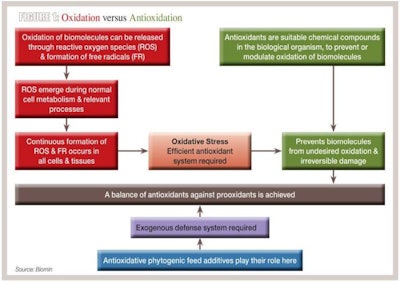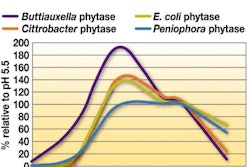
Antioxidants are natural substances that can protect an animal organism from harmful influences by preventing oxidation reactions, termed as oxidative stress. The antioxidative properties of phytogenic feed additives may provide such benefits when included in feed.
Antioxidants, being the defense system in vivo, comprise of several defense lines. The main defense line inhibits the formation of free radicals and formation of reactive oxygen species through isolating metal ions while destroying superoxide and singlet oxygen, which reduces hydrogen peroxide and hydro peroxides in every cell of the organism.
Free radical damage and oxidative stress are not diseases, but are often the byproducts of normal cellular processes. However, they do result in performance losses and damages in livestock production. In recent years, much attention has been paid to the involvement of free radicals and active oxygen in aging and in disease processes like inflammation, arthritis, heart disease, impairment of the immune system and cancer. Oxidative stress, an imbalance between increased levels of reactive oxygen species (ROS) and a reduced antioxidant activity can potentially destroy tissues and induce damage to cellular structures.
Essential oils in feed
Natural antioxidants are accepted worldwide and preferred to synthetic antioxidants. Studies suggest that thymol, carvacrol and 6-gingerol possess useful antioxidant properties and may become very important in the search for natural replacements of synthetic antioxidant food additives.
The antioxidative properties of certain phytogenic substances have been attributed to the phenolic terpenes in their essential oils. Plants high in terpenes include oregano, rosemary and thyme. The essential oils from plants, e.g. of the Labiatae family, have been used at large as antioxidants in human and pet foods with high fat content.
Artemisia annua, for example, is recommended as a natural phytogenic feed additive with antioxidant potential for use in poultry diets. As lipid oxidation is the main cause of the nutritional and organoleptic deterioration of birds’ meat, natural phenols—the main components of essential oils—are used because they delay muscle lipid oxidation in broiler chickens.
Restricting antioxidative processes is of prime importance for proper animal health, growth, production and economic feasibility. Based on the available literature to date, phytogenic feed additives offer a significant potential as a new generation of feed additives with pronounced antioxidative capacity for progressive and healthy food animal production.
Oxidation and antioxidation
To explain anti-oxidation simply, an antioxidant binds potentially dangerous free radicals and pulls them out of circulation. A radical bound in this way cannot cause any more damage to the organism. When more reactive oxygen species (ROS) are formed than the antioxidants are able to intercept, the outcome is oxidative stress, the cause of many chronic diseases.
There are a variety of mechanisms for antioxidation, namely endogenous and exogenous (nutritional). However, all of them have the same positive effects as the “buffering” of harmful substances. As long as there are enough antioxidants available, free radicals pose no serious problem for the organism. But, if too many free radicals are formed and not removed, all the biological structures suffer lasting damage. Therefore, it is useful and often necessary to support the animal through a variety of positive measures, which are effective, valuable and at the same time natural (Figure 1).
Antioxidative effects of phytogenic feed additives
In addition to the pronounced anti-inflammatory properties of phytogenic compounds in the digestive tract, protective effects of phytogenic compounds may also result from their antioxidative properties.
Antioxidative effects were reported for a large number of plant substances. An important cellular element is the transcription factor Nrf2. Activation of the Nrf2 pathway leads to the induction of genes responsible for cellular defense against ROS and detoxification of xenobiotics (chemical substances foreign to an organism). The use of a phytogenic feed additive was found to upregulate Nrf2 target genes, i.e. cytochrome P450 isoform 1A1 (CYP1A1), heme oxygenase-1 (HO-1) and UDP glucuronosyltransferase isoform 1A1 (UGT1A1). This provides further evidence of the protective effects of phytogenic compounds at the cellular level (Figure 2).
Therefore, regular supplementation of phytogenic feed additives in the diet may act as prophylactics against inflammatory reactions in the gastrointestinal tract by inhibiting the NF-κB pathway and stimulating the antioxidative factor Nrf2 (Figure 3).
Antioxidative effects of phytogenic feed additives on meat quality
The importance of antioxidants present in food is well appreciated for both preserving the food itself and supplying essential antioxidants in vivo.
Oxidation of lipids during food processing and storage is crucial, since polyunsaturated lipids oxidize and form hydro peroxides, which are vulnerable to further oxidation and/or decomposition to secondary reaction products, such as short-chain aldehydes, ketones and other oxygenated compounds. These may adversely affect the overall quality of food, including taste, flavor, nutritional value, concentrations of toxic compounds and keeping quality.
Researchers at the University of Athens observed that inclusion levels of the phytogenic feed additive in corn-soybean meal basal diets resulted in significantly higher plasma and total antioxidant capacity of broiler meat as determined by the oxygen radical absorbing capacity (ORAC) method.
Phytogenic perspectives
The antioxidative efficacy of phytogenic feed additives has been shown under in vitro and in vivo conditions. These phytogenic feed additives are effective in improving the antioxidant status of animals, as confirmed by an elevated antioxidative status in blood plasma, meat and the intestinal tract.
Enabling healthy meat production with enhanced storage quality is an added bonus to improved animal performance.
References are available upon request.














